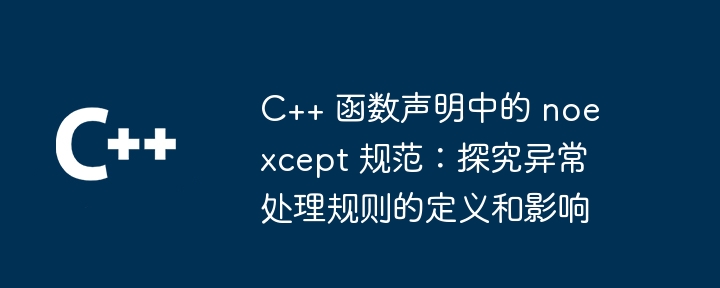
noexcept specification is a function declaration keyword that declares that a function will not throw exceptions, thus affecting: Optimization: The compiler can perform more optimizations. Performance: Checking noexcept at runtime is faster than checking exception types. Error handling: Programmers can better understand function behavior and handle errors accordingly.

Noexcept specification in C function declarations: Definition and impact
Noexcept specification
noexcept Specification is a keyword used in function declarations to declare to the compiler that the function will not throw any exceptions. It defines function behavior as follows:
noexcept (expression)
where expression is a Boolean expression. If the expression evaluates to true, the function is considered not to throw any exception. Otherwise, the function may throw an exception.
Impact of the noexcept specification
noexcept The specification has an impact on:
, the compiler can perform additional optimizations because it knows the function will not throw an exception. declaration is faster than checking the exception type. Specifications can help programmers better understand the behavior of functions and handle errors accordingly. Practical case
Consider the following function:int divide(int a, int b) {
// 检查除数是否为 0
if (b == 0) {
throw std::runtime_error("除数为 0");
}
return a / b;
}std::runtime_error Exception, this exception will be thrown when the divisor is 0. It can be declared as noexcept like this:
noexcept int divide(int a, int b) {
// 检查除数是否为 0
if (b == 0) {
throw std::runtime_error("除数为 0");
}
return a / b;
}The above is the detailed content of The noexcept specification in C++ function declarations: exploring the definition and impact of exception handling rules. For more information, please follow other related articles on the PHP Chinese website!
 What are the differences between c++ and c language
What are the differences between c++ and c language
 Recommended learning order for c++ and python
Recommended learning order for c++ and python
 Cost-effectiveness analysis of learning python and c++
Cost-effectiveness analysis of learning python and c++
 Is c language the same as c++?
Is c language the same as c++?
 Which is better to learn first, c language or c++?
Which is better to learn first, c language or c++?
 The difference and connection between c language and c++
The difference and connection between c language and c++
 C++ software Chinese change tutorial
C++ software Chinese change tutorial
 Cost-effectiveness analysis of learning python, java and c++
Cost-effectiveness analysis of learning python, java and c++




